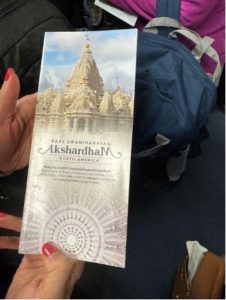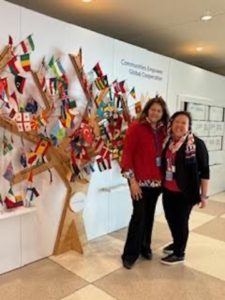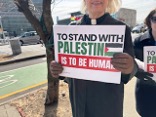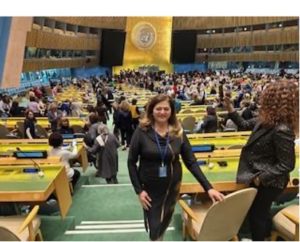CSW69 Reflection: Nina Khouri
REFLECTION #1
 As I stood in line to get my UN Ground Pass, I was fascinated by the cultural diversity represented from all over the world. I had a long conversation with four women from Morocco who worked for a Women’s Organization. I related to them because they were all public school teachers before they joined the organization. I heard them speak a certain Arabic dialect with which I was familiar, so I introduced myself and we had a great conversation about the status of women in their country. Behind me were two Hindu ladies, Nikki and Adhe, who shared a brochure about BAPS SWAMINARAYAN Akshardham, a cultural center and place of worship in North America. This is one of the most impressive Hindu architectures that I have ever seen. Then, the line started moving and I met a group of women with the Salvation Army from Sweden, Scotland, New Zealand, and France; after which, I met a woman from Mali. I took pictures with all these wonderful women.
As I stood in line to get my UN Ground Pass, I was fascinated by the cultural diversity represented from all over the world. I had a long conversation with four women from Morocco who worked for a Women’s Organization. I related to them because they were all public school teachers before they joined the organization. I heard them speak a certain Arabic dialect with which I was familiar, so I introduced myself and we had a great conversation about the status of women in their country. Behind me were two Hindu ladies, Nikki and Adhe, who shared a brochure about BAPS SWAMINARAYAN Akshardham, a cultural center and place of worship in North America. This is one of the most impressive Hindu architectures that I have ever seen. Then, the line started moving and I met a group of women with the Salvation Army from Sweden, Scotland, New Zealand, and France; after which, I met a woman from Mali. I took pictures with all these wonderful women.
Throughout the CSW events, I kept meeting women from Africa, Asia, and the Middle East. As a Multilingual teacher and world traveler, I have had a lot of experiences in multi-cultural interactions with people from all over the world. Being in the United Nations ignited my love and interest in multiculturalism and I felt exhilarated.
Before coming to the UN CWS69, I tried to read as much as I could about the Beijing Declaration and Platform of Action with the twelve critical areas of concern: women and poverty; education and training of women; women and health; violence against women; women and armed conflict; women and the economy; women in power and decision making; institutional mechanisms for the advancement of women; human rights of women; women and the media; women and the environment; and the girl child.
I never thought that I would meet so many people with the same concerns from different parts of the world. The CSW brought us together in unity holding us all accountable with what we are doing for women’s rights which are human rights. In this review of the Beijing Declaration, it is hard to see that even with the little progress made with women’s rights, there is still a long journey to be accomplished. Our hope is in the Lord and all we can do is take it a step at a time doing what we can for women’s rights.
REFLECTION #2

 The highlight of my experiences during the UN CSW69 was the vigil for Palestine. For the first time in my life, I felt that I did something publicly to promote the human rights of Palestinians who are undergoing a lot of suffering in their own land.
The highlight of my experiences during the UN CSW69 was the vigil for Palestine. For the first time in my life, I felt that I did something publicly to promote the human rights of Palestinians who are undergoing a lot of suffering in their own land.
Beijing Platform of Action #212 states: The promotion and protection of all human rights and fundamental freedoms must be considered as a priority objective of the United Nations, in accordance with its purposes and principles, in particular with the purpose of international cooperation. In the framework of these purposes and principles, the promotion and protection of all human rights is a legitimate concern of the international community. The international community must treat human rights globally in a fair and equal manner, on the same footing, and with the same emphasis. The Platform for Action reaffirms the importance of ensuring the universality, objectivity and non-selectivity of the consideration of human rights issues.
On a personal note, both my grandfathers were originally from Palestine; whereas my grandmothers were Lebanese. My parents left Haifa, Palestine during the Israeli invasion in 1948 and went to Lebanon. Several years after that, both my sister and I were born, so we had the Lebanese identity. We never visited Palestine. Therefore, this vigil was very meaningful to me and close to my heart. I felt emotional while standing with others for one and a half hours.
The vigil for Palestine was silent; however, as we held up the signs/posters, it was like a million words. I observed people as they walked by. Many gave their affirmation by signaling thumbs up, nodding, smiling, or even saying out loud, “Freedom for Palestine!” Others passed by silently, some with their heads down. We debriefed after the vigil and many participants shared their positive input about the vigil. One person mentioned how courageous and resilient the Palestinian women are as they take care of their young ones with limited resources. Finally, we thanked the organizers and the police who were standing there for protection.
This is my first time as a delegate. I learned a lot about the United Nations and the Beijing Declaration. It was fascinating to walk around the UN building reading wall displays, enjoying the art, and observing people from all over the world. I particularly enjoyed the Saudi Arabian Exhibit and the meditation room.
In addition, I learned that I have to pace myself. Before I came to NYC, I filled my calendar for 5 days (M-F) with all the sessions I wanted to attend at the UN, Salvation Army, Church Center, and virtual sessions. My calendar was too ambitious. I was not able to attend all the sessions I wanted to attend. I was interested in attending several sessions on violence against women, but that was not possible given the time limitations and distances between buildings.
I truly enjoyed our worship time in the morning at the chapel of the church center building. The worship services were uplifting and they set the purpose for the rest of our day. Thank you to all who organized and led these services.
REFLECTION #3
 I attended informative and thought provoking sessions at the UN building, church building, and online. Here are some highlights of a few sessions.
I attended informative and thought provoking sessions at the UN building, church building, and online. Here are some highlights of a few sessions.
Town Hall Meeting with the United Nations Secretary General and Civil Society in the margins of the sixty ninth session of the Commission on the Status of Women:
- If we look around the Town hall, we realize the dominant presence of women with some men in attendance.
- I submitted this question in the basket (but it was not selected): How are we involving our male counterparts to support us in educating others and in our discussions on the human rights of women and girls?
- The General Secretary mentioned the following:
- Beijing Women’s organization has secured gains; I applaud your efforts.
- Inequality is a question of power; male dominated country. Together we must work for gender equality.
- Gender equality plan/Global Family movement: we must push for equality of women and girls. Push back on the push back. Push support for technology, engineering, and math; there is a biased fundamental priority, a power relation in technology. We must push all parties to action.
- We must work together to make gender equality a reality for all.
- A gender equality plan was presented by Pamela. The Gen. secretary mentioned that we are not doing enough for this plan. A survey was conducted. However, the collection and use of data needs improvement.
- During the general secretary’s term, the presence of women in the UN increased to 40%.
- A question from the floor was applauded by all present: When will we have a woman general secretary?
Power4Girls:
- Invest in girls, transform the world. Empower adolescent girls: listen to their voices; see strength of girls; leaders of today.
- Champions for girls’ rights; fight for that; every girl has the power to her own future. Sierra Leone male talking in support of girls; declared rape as a national emergency.
- Women and decision making; voices to be heard; young women should have an agency to speak and be heard. Investment in girls transforms girls’ lives.
- Priority in government in the UK: Youth parliament 50/50 boys and girls; equality for women. Strengthen curriculum including teachers to stop violence; tribute to make alliance like minister from Sierra Leone.
- Romania advocates for girls’ human rights.
- Girl from Cambodia spoke; she was in a rural area; she was held back but she took the opportunity to use technology as a tool. She is an AI engineer now.
- Ambassador from Germany: invest in girls; transform systems from holding back girls.
- Ambassador from Canada: girls experienced discrimination in their lives; attacked dignity; losing so much when we don’t invest in girls; doing something special for all of us.
I was impressed to hear male ambassadors talk about empowerment of girls and their human rights.
Girls on Fire (for Justice):
This virtual session really spoke to me and made me think of what my vision is to support women and girls. I realized that we still have a lot of work to do in the US with justice for women. We need to end gender based violence; there is structural violence against women in which we need to pass laws and construct systems and institutions that are not gender biased.
Three women spoke and answered two questions.
What’s the focus of your advocacy?
- Elaine Castro De La Luz empowers women to become leaders and make decisions on their own.
- Kearra Haynes: Black women are more likely to die during childbirth; she did research design to train medical student professionals to understand their black women patients.
- Zodinpuii: her passion is to advocate for women going through domestic violence. Her vision is to teach boys how to behave towards girls. Stop when they say no.
What keeps you ignited and going?
- Zodinpuii: I motivate myself. I know if I can help one woman or girl and their life is changed, then I keep my fire. When I interact with others who are doing the same work, I get reignited.
- Elaine: Engage in the mission field and see that God’s heart is for justice. I keep the fire going even though it’s negative. I’m rooted in God and learning from others walking alongside me.
- Kearra: Understand your calling and commitment to it. You cannot finish the work but stay committed to it. Seeing fire in others’ eyes keeps me going. Don’t be silent. We dont need passive bystanders.
As I listened during the sessions I attended and as I reflected on what I learned and heard, I asked myself:
What do I envision to do in my life after being a PW delegate to the Commission on the Status of Women?
This is not the work of an individual but a collaborative enterprise with co-visioning. I will pray that God will give me a vision of what I am supposed to do. I will talk to other women about a vision.
For example, talk to Ashley Stanley, Co-Facilitator of the Racial Equity Dialogue Team on how we can incorporate women’s rights in our circles. Another example is to talk to Pam Snyder on how we can introduce the topic of women’s rights to our synods and presbyteries. At the church level, we may have a mentoring program for the girl child.
How have I changed after the UN CSW69?
I have more courage to stand up for women’s rights with my knowledge of the Beijing Declaration and Platform for Action. Now, I have a framework to work from. I can use my experiences with being oppressed as a woman; on the other hand, I also experienced many leadership roles at work as an administrator and at the church level.
